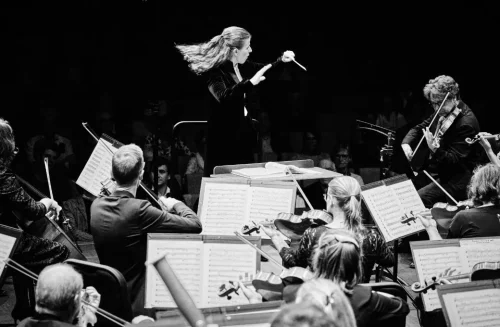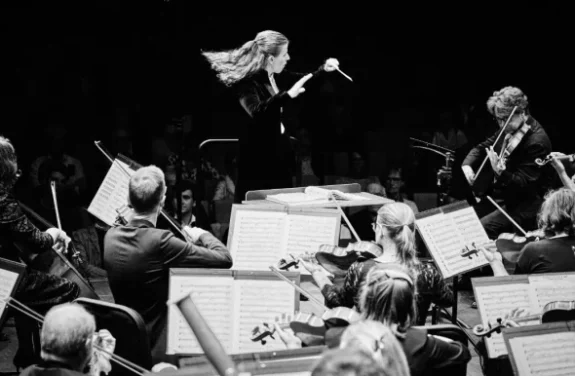
 United Kingdom Mozart, Beethoven: Yena Choi (soprano), Kadi Jürgens (mezzo-soprano) , Denzil Delaere (tenor), Christian Immler (bass), Sheffield Philharmonic Chorus, Flanders Symphony Orchestra / Kristiina Poska (conductor), Usher Hall, Edinburgh, 23.6.2024. (GT)
United Kingdom Mozart, Beethoven: Yena Choi (soprano), Kadi Jürgens (mezzo-soprano) , Denzil Delaere (tenor), Christian Immler (bass), Sheffield Philharmonic Chorus, Flanders Symphony Orchestra / Kristiina Poska (conductor), Usher Hall, Edinburgh, 23.6.2024. (GT)
Mozart – Overture to Don Giovanni, K.527; Requiem in D minor, K.626
Beethoven – Symphony No.8 in F major, Op.93
The Flanders Symphony Orchestra are among the finest ensembles in Belgium – this is the third occasion they have visited Edinburgh, the last time being in 2019 when their conductor was Jan Latham-Koenig. Based in Ghent, they have an enviable programme of touring internationally and recording. Ghent is twinned with Tallinn, so it is no surprise they selected an Estonian music director, Kristiina Poska. Estonia has a rich heritage of producing outstanding conductors and singers; the Järvi family alone have provided three international conductors, and music is at its heart; choral singing is popular, and the small Baltic country has been the birthplace of composers such as Ester Mägi, Pärt, Tüür, and Tubin. Poska, who has been chief conductor since 2019, has already conducted the Royal Scottish National Orchestra and the Scottish Chamber Orchestra in diverse repertoire in recent seasons.
The Don Giovanni overture brought out in its dark introduction dramatically sculpted sforzati, that led to daunting passages on the violins, and under Poska’s direction, the orchestra seemed somewhat bombastic, with the natural brass and timpani quite strident. Rather than sweeping gestures, the conductor held a firm tempo with limited waves of the baton grasped in her left and her right hand for expression. The sway between demonic forces and passion was prevalent. At the same time – in the central section – there emerged a beautifully life-enhancing theme, and – changing from the minor key – there sprang an upbeat climax in the celebrant key of C major. Less attention was given by Poska to colour and expression; the harmonies were somewhat repressed and underwhelming – yet produced a dynamically powerful performance.
The dynamic stridency continued into the Beethoven symphony – Poska produced an intense reading of the Eighth – a work often overlooked between the magisterial Seventh and the choral Ninth symphonies. The Eighth Symphony is full of humour and excitement, and the Belgians provided plenty of this with virtuosity in the outstanding playing of the woodwind group – especially the flute of Caroline Peeters, the clarinet of Daniel Mourek, and the bassoon of Koen Coppe in the opening movement (Allegro vivace con brio). Poska’s direction allowed the orchestra to bring out the upbeat mood with a velvety exuberance in the strings, and the pianissimo at the end sounded like a farewell.
The second movement (Allegretto scherzando) was charming, with colourful ideas shared on the woodwind reminding one of the exquisite virtuosity of the Belgian musicians. The (Tempo di menuetto) was portrayed as an ebulliently rustic dance, and the second of the two trios was brilliantly performed by the horn of Hanna Guirten and clarinet of Mourek in a vitally alluring discourse – and when joined by the violins there came a lovely intimacy in the music making. The Finale (Allegro vivace) reprised the upbeat theme of the opening movement with a cascade of vibrant playing. A factor in this performance was the natural horns, which together with the thumps from Tom Lee on the period timpani helped create joyous excitement leading to the brilliant finale.
In the Mozart Requiem, the four soloists were in the wings – only approaching centre stage when singing, and the timpani were on the left of the orchestra, with the organ continuo. The orchestral prelude was begun by Poska with the bassoons and basset horns announcing the plaintive opening idea coupled with the trombones. The magnitude of this work was heard In the Introitus, with an overwhelming warmth of humanity heard in the dulcet timbre of the choral singing. The Sheffield chorus was magnificent in their opening forte passage – one is often staggered when hearing a great English chorus accompanied by a top-class orchestra.
The perception of mourning prevailed, yet the mood was alleviated by the glorious soprano of Yena Choi in the ‘Ex lux perpetua luceat eis’ singing from the wings. In the Kyrie, the singing was magnificent, yet led to a sense of unease and anticipation. The momentum created by the Estonian conductor was masterly, and the Dies Irae – especially in its serenity – and in the Tuba mirum, the bass of Christian Immler was majestic as he sang the theme of the earlier trombone passage – while the tenor Denzil Delaere sang in the transformed minor key, allowing the dark, oppressive mood to fade, as the Estonian mezzo-soprano Kadi Jürgens sang a beautifully expressive aria, and this sequence became even more enlightened in the singing of Choi. The uplifting mood was magnified by the glorious chorus in the Rex tremendae majestatis.
The orchestral playing, especially the woodwind, was sublime when enhanced by the female voices of the chorus and the quartet of soloists. Yet this optimism was disrupted by the chorus singing Confutatis maledictus, leading to the beautifully performed ‘Lacrimosa dies illa’. In the Lacrimosa, the coloratura sopranos accompanied by the timpani and then joined by the chorus in a somewhat gently rocking phrase was sublime. In the Offertorium, the quartet was once again outstanding, especially the soprano and mezzo voices in the Dominum Jesu section. The timpani thuds opened dramatically, the Sanctus, in a captivating passage of music making, while in the Benedictus, the soloists again were glorious, following the sublime orchestral introduction, most notably the dark-hued bass of Immler and the uplifting sublime mezzo-soprano of Jürgens.
There was magnificent singing by the quartet in the Benedictus – preparing us for the Agnus dei, and as the full voices of the chorus were heard, by switching the tempo ever so succinctly, in the Communio: Lux aeterna, Poska allowed a sombre gravitas in the choral singing before closing this magnificent performance superbly. The direction of the huge forces on stage by Poska was masterful. As an encore, the chorus, soloists and orchestra performed Mozart’s ‘Ave verum corpus’ to bring this afternoon concert in Edinburgh’s international concert season to a vibrant close. The next concert in the Sunday Classics series will be a visit by the Hungarian Radio Symphony Orchestra in December, if they are anything as good as last year’s performance by their Concerto Budapest compatriots, this will be worth waiting for.
Find details of the 2024-25 programme by clicking here.
Gregor Tassie
